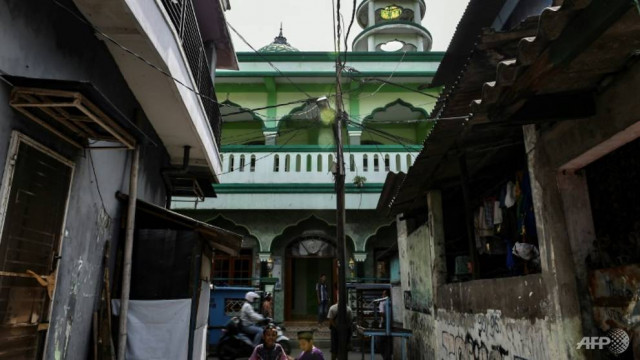Indonesia's vigilante mobs deliver brutal 'justice'
According to World Bank data, Indonesia has recorded nearly 34,000 vigilante attacks between 2005 and 2014

Stealing from a mosque is seen by some as an attack on Islam itself. PHOTO AFP
The lynching was one of hundreds of vigilante killings across Indonesia in recent years, highlighting a brutal trend driven by rising religious conservatism and low faith in a corruption-riddled justice system.
Mob violence has also been aggravated by rapid urbanisation that brings together strangers from across the Southeast Asian nation in often poor, overcrowded neighbourhoods, raising stress levels and fuelling mistrust, observers say.
The lynching had echoes of the grisly 2017 murder of 30-year-old Muhammad al-Zahra who was set ablaze for allegedly stealing a mosque's amplifier in the hardscrabble Jakarta suburb Bekasi, as onlookers cheered and filmed the scene on mobile phones.
As the electronics repairman pleaded for his life, insisting he was not a thief, the frenzied mob poured gasoline over him and took his life.
His widow, who miscarried their second child days after his death, told reporters that her husband often fixed damaged equipment — including amplifiers — before reselling them.
Half a dozen people were sentenced to between six and seven years in prison over the attack, as doubts about his guilt lingered.
Stealing from a mosque is seen by some as an attack on Islam itself, and helps explain the eruption of such violence in the world's biggest Muslim-majority country, according to Heru Susetyo, a law professor at the University of Indonesia.
Indonesian police kill two "terrorists" on eastern island
"(Many vigilantes) are Muslims who aren't necessarily that devout, but they are easily provoked by these incidents," he said.
"They are even willing to commit violence for the sake of 'defending' Islam."
In the neighbourhood where the more recent attack happened, one man said he understood the desire to punish those who steal from a place of worship.
"(But) thieves should be caught and handed over to police," said Sahanan, who like many Indonesians goes by one name.
Few in Indonesia, however, espouse any faith in the graft-riddled justice system.
"The main problem is a lack of trust in the authorities," said Agustinus Pohan, a law professor at Indonesia's Parahyangan University.
"Those with power or money get special treatment. That's why people refuse to trust the police and decide to take matters into their own hands."
Another factor is the disproportionate impact of theft on the poor, who lack insurance or a cushion of savings — coupled with the relatively light sentences handed out to many petty criminals.
Indonesia's government does not release figures on mob violence.
But according to World Bank data, the country recorded nearly 34,000 vigilante attacks involving serious injury or death between 2005 and 2014.
The eye-watering figures — including over 1,600 killings — were based on local media reports drawn from regions which are home to only about half of Indonesia's 260 million people, suggesting that the real numbers could be even higher.
Sana Jaffrey, a University of Chicago doctoral researcher who led the World Bank team, said a range of factors were responsible for stoking mob violence, including poverty and a lack of trust in police.
Suspected Indonesian radical killed in counter-terrorism operation
But she rejected the notion that such attacks were spontaneous bursts of violence by a wild-eyed mob, saying they usually involved an element of planning and sometimes a powerful local figure.
In July, a gun-toting village leader in East Java reportedly encouraged seven men to attack a suspected motorcycle thief with sticks and rocks before his gasoline-soaked body was set on fire.
"The police only take action against vigilantes when the victim of the mob does not fit the profile of a criminal and the family protests or when there is an ethnic angle... and they fear escalation into a larger, communal conflict", Jaffrey said.
Although mob violence usually rises in lockstep with social and political chaos, Indonesia, which has transitioned to stable democracy over the past two decades, has bucked the trend, Jaffrey said.
"More institutional stability and more (violence) — these two things don't go together in most parts of the world."
Suspected criminals are not the only victims of mob justice in Indonesia.
This year, half a dozen men beat and stripped a young couple before parading them naked around their neighbourhood over suspicions the pair had premarital sex.
In Aceh province, which is ruled by Islamic law, public humiliations by citizen groups — and sometimes even police — have become increasingly common.
A viral video in April showed a young, unmarried Aceh couple being doused with raw sewage after they were seen alone — an offence punishable by caning in the conservative province.
None of the young men who attacked them were punished.
Authorities say rising vigilantism is a grim indictment of Indonesian society rather than a reflection of their failure to deliver justice.
"These incidents show that the social system isn't working well," said Jakarta Police spokesperson Argo Yuwono.
"We need to promote a sense of mutual cooperation and respect."



















COMMENTS
Comments are moderated and generally will be posted if they are on-topic and not abusive.
For more information, please see our Comments FAQ